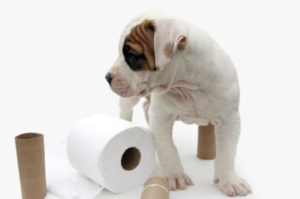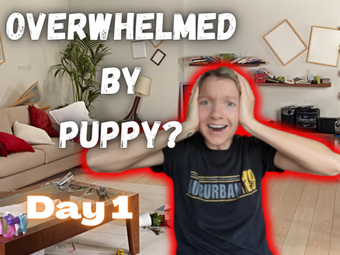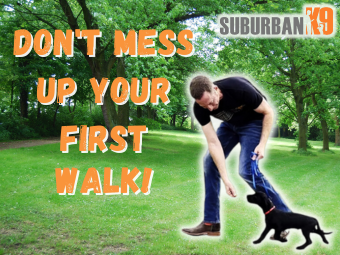 As the proud owner of a new puppy you are probably thinking about house breaking them. But what does house breaking a puppy even mean?
As the proud owner of a new puppy you are probably thinking about house breaking them. But what does house breaking a puppy even mean?
If you are like most puppy owners, you are dealing with two very common “issues”. Cute little puppies can easily test your patience as you are trying to potty train them and teach them not to bite everything in sight, including you!
Raising a puppy takes work, but with a little knowledge and some specific rules it can be much easier than anticipated.
What is House Breaking?
House breaking a puppy is a little bit different than teaching your puppy obedience commands. House breaking is all about establishing house rules for your puppy to live by. This includes two of your major dog training tasks of potty training and crate training. But it goes beyond that to include:
- Nipping
- Barking
- Chewing and stealing things
- Areas of the house/furniture rules
- How to play properly
As you can see, there is a ton to work on with House Breaking. Don't worry about obedience until your puppy is doing great with these things around your house.
When Should You Start House Breaking Your Puppy?
We consider house breaking to be the first thing that you should start working on with your puppy. Long before training obedience or tricks. We recommend getting started in the first week of bringing home your puppy.
The sooner you set these rules, the easier it will be for your puppy. If you are consistent from the start, your puppy will learn quickly and house breaking will be simple.
Potty Training Your Pup
Like we said, potty training is probably the most important part of house breaking your puppy. When bringing a new puppy into the home it is important to know two facts:
First, an eight week old dog cannot hold his bladder for a long period of time.
Second, he doesn’t know that he is expected to!
When your puppy lived with mom, they were allowed to walk two feet from their bed and pee and then walk back and lay down. Now your pup is in a new environment where people get mad when they follow the rules that momma dog set up for him.
Teach your dog your potty training housebreaking rules
You now need to teach the dog a new set of rules; don’t go to the bathroom in the house and go to the bathroom outside in a timely manner. Keep in mind that to a dog the house is just a place, carpet and rugs are meaningless to a puppy. Your bedroom is not special and anywhere may seem like a great place to do their business.
House Breaking a Puppy Potty Frequency
You should take a young dog (8-10 weeks) out about every thirty minutes to relieve himself. Teach a word for going such as “go outside.” When he finishes going, immediately praise him, give him a treat, and repeat his command for going. Once your puppy learns the process you can begin to teach him to go every time you take him out.
What to do if your Puppy Doesn't Go Potty?
If the dog refuses to go potty after a reasonable amount of time because he wants to walk around and sniff simply take him inside and put him in a cage for fifteen minutes. This is not meant to be punishment. This prevents the dog from coming inside and peeing on the floor immediately. After fifteen minutes take him out of the crate and back outside, tell him “go outside”. Repeat the praising process if he goes. If he does not go, you can repeat the crating process.
Teaching your Pup not to Go Potty Inside
The dog should now know that you like when he goes outside, so now you need to teach him that you don’t like when he goes inside. The key to this is NEVER letting him out of your sight until you trust him. Use gates, playpens, etc. or just follow him when he wanders off.
If he goes and you don’t catch him, it is too late to correct and your potty training will be set back. Every “accident” should be a learning experience for you and the dog. If you see him going in the house, say NO in a firm voice, rush him outside, and praise him if he finishes out in the yard.
Be Consistent!
This is a system that works very well, but a lack of consistency will undermine your efforts. The first month will not always be fun, following you dog constantly and always watching, but it is very attainable to have a fully potty trained dog by three or four months of age.
Should you use Bells for House Breaking?
To use bells or not is another important decision when house breaking your puppy. Many times we will tell clients that this is unnecessary. Many people still like this approach as it gives them a warning that their dog needs to go out. If you are going to use bells there are two main types we would suggest.
- Smart Potty Training: A must have puppy Supplies at home, easily and more effectively training your dogs!
- Super Durability: Made from heavy duty nylon material, durable & chew resistant.
- Adjustable Length: Its ergonomic design allows for easily adjusting the length between 12" and 15" from the ground.
- Super Easy Training: Join the many who have achieved success from the dog bell for door potty training.
- Pressure Alarm: From deterring intruders with a loud alarm to letting you know when your pet wants a walk with a gentle chime, this pressure alarm mat is useful as a door mat, a pet doorbell mat, an alarm for sleepwalkers, or part of an indoor security syste
- Dimensions: The pressure mat alarm dimensions are 21.75 x 13.75, and is activated with a pressure load as light as 1lb per square inch
- Setup: Once youve inserted the 9V batteries (not included) and connected the mat to the 30 wired alarm unit, you can place this pressure sensor pad beneath a window, under a lightweight pet door mat to hear the comings and goings of your pets, or any other indoor space
- Select Your Mode: With three modes (Off/Alarm/Chime) to choose from, you can adjust your floor mat alarm to suit your home alarm system or welcome mat needs, and disable it entirely when the alarm mat is not needed
- Package Includes: Pressure sensor pad (mat alarm), alarm unit, mounting screws, and instructions
Need more House Breaking Help?
If you want help with potty training for your dog, check out our online course: Suburban K9's Potty Training Academy from our company founder Matt Covey or get a price quote to meet one of our professional dog trainers in person!
House Breaking a Puppy with a Crate
Crate training is another extremely important part of House breaking your puppy. Working on crate training will help with potty training. It will also give your pup a safe place to hang out. This is crucial to ensuring your pup isn't getting into trouble. We have a full write up that goes over How to Crate Train Your Puppy.
Nipping
Nipping is a very common behavior exhibited by puppies. Young dogs nip each other constantly throughout the day as they play, and they learn certain rules. They learn not to nip too hard, or the other dogs get mad and not to nip “mom” when she isn’t in the mood.
Teaching Your Puppy Not to Nip
When you bring your puppy home it is time to teach him to never nip humans. A nip is one of two things, a rough type of play or an expression of frustration, neither of which should be used on humans. When the dog is eight weeks old you can gently correct the nips by pushing the dog away and saying “no”. Don’t yell the word, but it is equally important not to use baby talk as you tell him no.
Keep in mind that every dog is different, and some puppies may start to nip harder if you push them away. If the puppy is in a rambunctious mood you can find a toy and start playing with him. It is important that the dog doesn’t learn to nip to encourage you to play with him, so always correct first and then find a toy to play with.
If the puppy gets worse each time you correct him there are many different ways to address the issue. A leash and collar can be left on him so that he can be walked until he is calm. If you need help with nipping contact us for more help!
Chewing and Stealing Things
Is your dog constantly chewing and stealing things? This is another common area that you should cover in House Breaking your puppy. Check out our detailed article Stop Your Puppy Stealing Things. It goes over everything you need to know to stop this behavior.
House Breaking Rules for Furniture
Another thing your puppy won't know when you bring them home is if they are allowed on furniture or not. Going one step further, they won't even know if they are allowed in certain rooms. You can decide to let them every where and on every piece of furniture. Or, you could make very specific rules for each room and piece of furniture.
Make sure everyone in the house is being consistent and applying the same rules. Once again, if you start early your dog should learn the rules quickly. Check out our Getting a Puppy Checklist to learn more.
House Breaking: Conclusion
As you progress in training your dog and teaching him manners it is very important to keep in mind that dogs do not learn like humans. You cannot rationalize or negotiate with a dog! Make sure that you have clearly defined rules and that everyone in the house is 100% consistent! If you work hard during the first two months after you bring your puppy home you will enjoy the benefits of having a gentle and potty trained dog for years to come.
The article above contains Affiliate Links from Amazon and other companies. If you visit their site and buy the product, we will get a small commission. Please know that we only recommend products we truly love and would never recommend a product we don't think is incredible. We look at and try hundreds of products before we ever recommend them to our clients!







